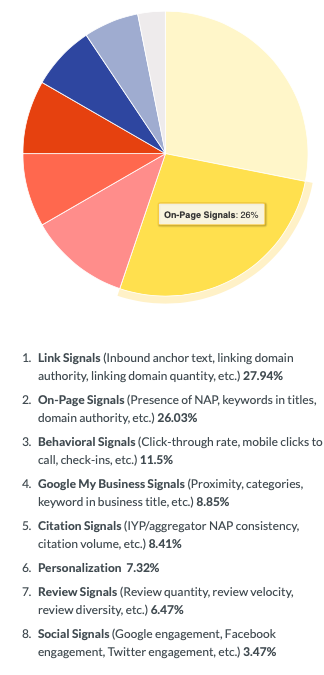Content is the differentiator that makes a brand stand out from its competitors.
Great writing affects people’s perception of your company and influences their purchasing decisions.
Content marketing generally results in higher ROIs than any other type of advertising.

There are two key separations within content creation (particularly when it comes to SEO):
SEO copywriting and SEO content writing.
Now, this is certainly a little bit confusing given the fact that both of these components have plenty of overlap.
Let’s dive into the specifics.
What Are the Goals of SEO Copywriting and SEO Content Writing?
One of the clearest distinctions between these two components is the overall objective.
By definition, copywriting is, “The act of writing text for the purpose of advertising…written content that aims to increase brand awareness and ultimately persuade a person or group to take a particular action.”
SEO content writing, on the other hand, tends to focus more on driving in organic traffic by providing answers to specific questions. Content writing is more about brand awareness and showcasing expertise, whereas SEO copywriting is focused on drawing in traffic to a website and converting.
SEO copywriting is typically much shorter and to-the-point because it has a main objective, like “sign up for an email” or “buy now.” So, when you see an online advertisement, website content, and landing pages, you are seeing SEO copywriting.
You can see an example of this here with a PPC Ad for joggers via Kohl’s.
This content has one main objective: to get viewers to click on the link to the catalog page, and hopefully, buy something.

SEO content writing, on the other hand, is focused on creating awareness and interest through organic searches – rather than targeted advertisements or SEO copy – which are primarily focused on getting leads/sales.
Content writing also focuses more on storytelling. In Outdoor Voice’s case, they have created an online magazine and blog titled The Recreationalist – which focuses on building brand awareness through insightful articles.

You can see where the differences lie in terms of length and ultimate goals quite clearly.
Essentially, SEO copywriting is about attracting people who are most interested to buy, whereas SEO content writing is about attracting people wanting to learn.
Copywriters focus on creating content that is brief and succinct with a blatant objective. Content writers are creating a brand story through longer content that is made to draw in audiences and teach or tell them something.
Content Writers and Copywriters have Different Jobs/Skillsets
While some talented writers can certainly handle the tasks of both content writing and copywriting, they do require separate skillsets and are often handled by different people.
Of course, there are some commonalities between these two jobs.
- Both require strong language and writing skills.
- Both copywriters and content writers need to have a firm understanding of the importance of SEOas well as ways to research, measure, analyze, and utilize keywords in their content.
Copywriters have to persuade their audience towards action. They need to know how to really get into their customers’ heads and determine what will spark a conversion.
Copywriters need to be extremely versatile in their skills – as they will need to create content for PPC ads, email marketing, social media advertising, and more.
And finally, copywriters tend to work on short deadlines, so they need to be able to think and create new material quickly. Many copywriters are in charge of handling social media accounts, so the ability to spot a trend and create great content on a moment’s notice is a valuable skill to have.
Think of copywriters like motivational speakers: they grab your attention, give you some memorable quotes, and spur you towards action.

Content writers, on the other hand, are like novelists. They take their time by creating a story that slowly pulls you in, and eventually, you start to see the message they are trying to get across.

Content writers are creating content that works to explain, build brand awareness, and make their audience smarter.
Since content writers have the opportunity to create long-form content – as opposed to short advertisements – they need to have strong writing skills to keep their audience engaged and interested.
They also need to be experts at answering trending questions in a way that truly speaks to the target audience – as this will change with each platform the content lives on.
SEO Copywriting and Backend SEO
Obviously, SEO knowledge is a key component of both copywriting and content writing.
But as content writers are focused primarily on top-of-the-funnel keyword research and inclusion, copywriters have more of a focus on the backend aspects of SEO as well.
There is a lot more that goes into SEO than just including the right keywords. Google not only wants to offer its users results that match up to their inquiries, but also ones that will give them the best online experience.
According to the latest research, on-page signals like keywords in titles and meta descriptions made up over 26% of Google’s ranking factors.
SEO copywriters are responsible for optimizing on-site content to send stronger ranking signals to Google for higher placements in the search engine results pages. This involves proper keyword placement throughout a website, such as headlines, tags, and body content to increase keyword frequency for more query matches.
SEO Content Writing and Blogging
Content writers are responsible for creating long-form pieces that will draw in audiences based on the topic or informational intent, like this blog post from Quip about whether to use a manual or electric toothbrush.

In addition to making great content that’s interesting, and relevant to their audience, content writers also need to be mindful of how they structure it to make it easier for people to navigate.
One of the best ways to do this is to build site content with topic clusters, which are collections of individual articles that are linked to large, overarching topics. These are called “content pillars.”
You can see an example of content pillars and clusters on the blog “The Wellnest.” The health blog has several main pillar topics: skin, hair, body, mind, food, and science.

Topics that fall into these categories are organized under the main pillars.
So, if a visitor is looking for specific information on skin care – including acne, dryness, and dullness, they will find it under the skin pillar.

In addition to making your website more structured so visitors can find the content they are interested in, there are several benefits to using this approach.
First of all, it can help writers organize their thoughts and come up with relevant content by narrowing down the topic possibilities.
Secondly, using a topic pillar and cluster format can do wonders to improve your site’s SEO value.
Search engines are constantly trying to determine the content that best matches up with a searcher’s intent. By clustering your topics into related categories, it shows Google the semantic relationship between your pages.
Since Google uses latent semantic indexing (or LSI) to examine text and find correlations with keywords in a query, clustering your content makes it easier for the search engine to “understand” the contextual nature of a piece of content.
To reiterate, the primary goal of SEO content writing is to increase awareness and interest. That said, these pieces should revolve around top-of-the funnel keywords to draw in relevant traffic.
This requires understanding the intent that will attract people to your site. This is commonly related to issue awareness, such as “how do I clean shag carpet?” or “what is the best toothbrush for sensitive teeth?”

To find/use top-of-the-funnel keywords, content writers need to understand which subjects matter the most to their audience and the kinds of questions they are asking. Free tools like Ubersuggest make this super easy.

There is Some Overlap
So, as you can see, there is certainly some overlap between both SEO content writing and copywriting. Both are concerned with improving a website’s ranking and driving in customers through keyword inclusion – just in different ways.
The most important aspect about both content writing and copywriting is to create a unified strategy. Each component must work cohesively to optimize content for both audiences and search engine algorithms.
Conclusion
Content is one of the most powerful marketing tools available to modern businesses.
Content creates connection.
It draws people in through organic searches and explains to them what you do, proves you’re an expert, and why they should buy your product/service.
If you have any questions about SEO copywriting, content writing, or how they can work together to boost your bottom line, let’s chat today!
Jack Shepler is a Marketing and Search Engine Optimization expert. He founded Ayokay, award-winning marketing, and web design firm in Indianapolis, Indiana that has built brands, increased sales for businesses, and helped nonprofit organizations fulfill their missions since 2011. He uses his decades of experience to educate through the Ayokay blog and through public speaking. You can follow him on LinkedIn.







